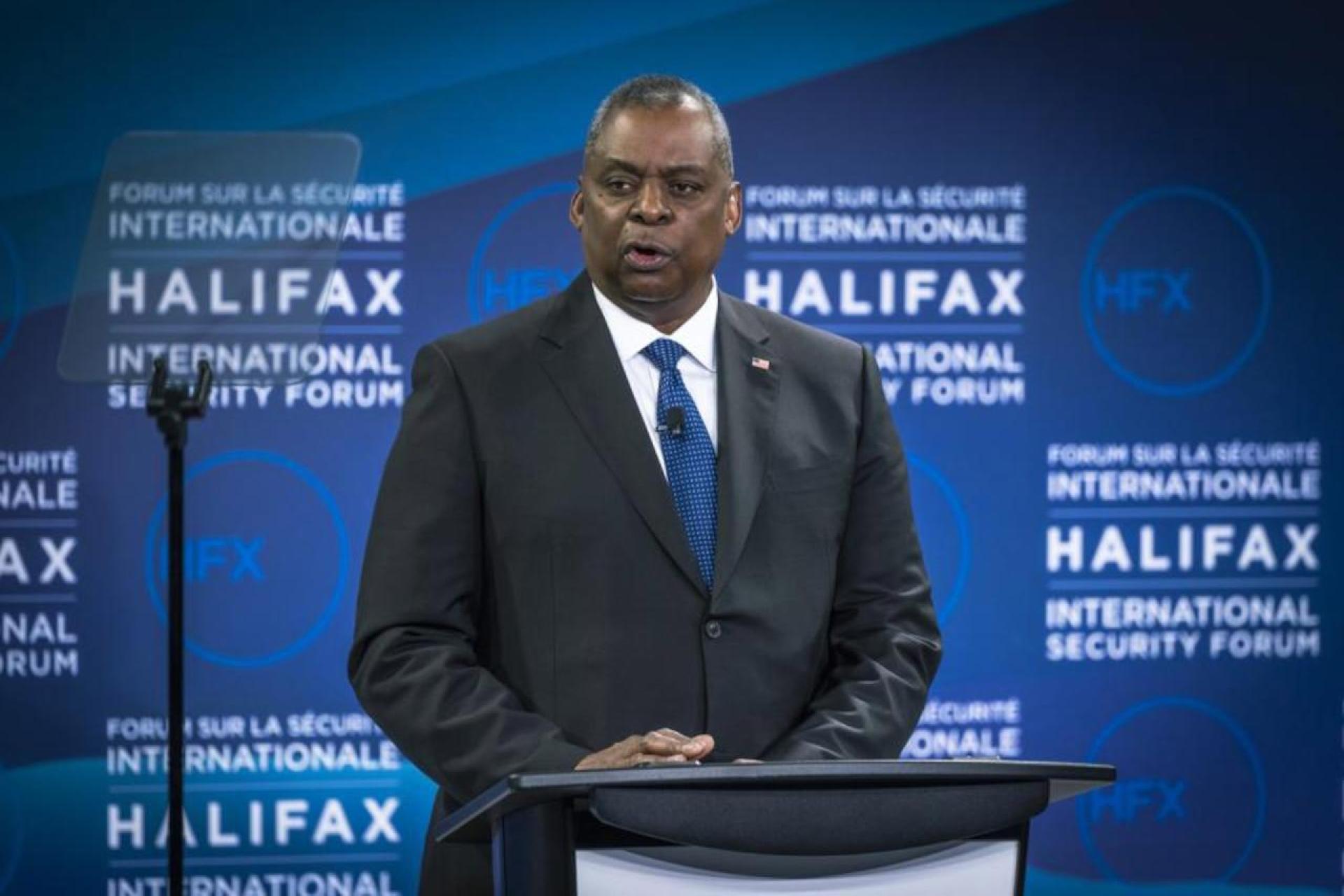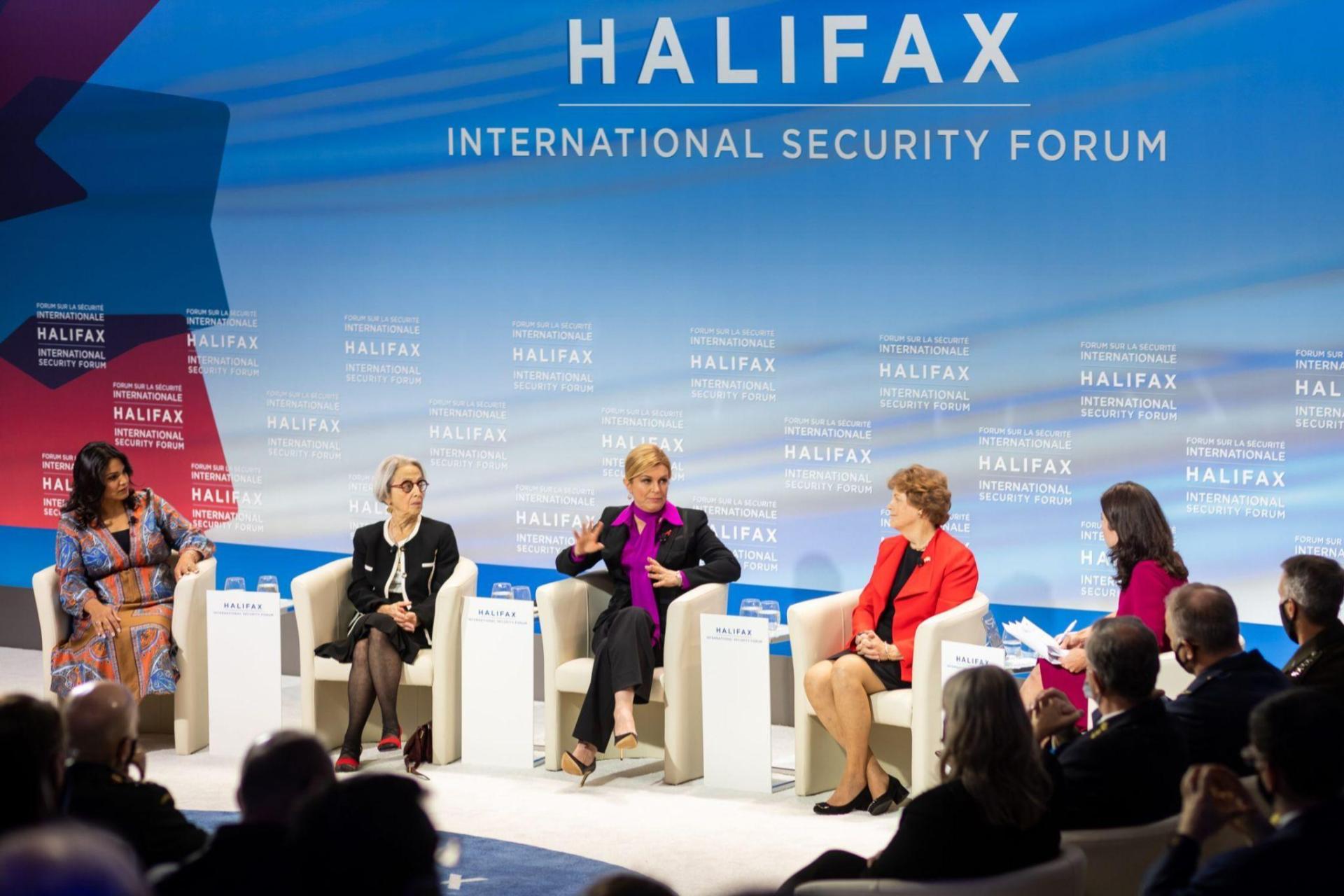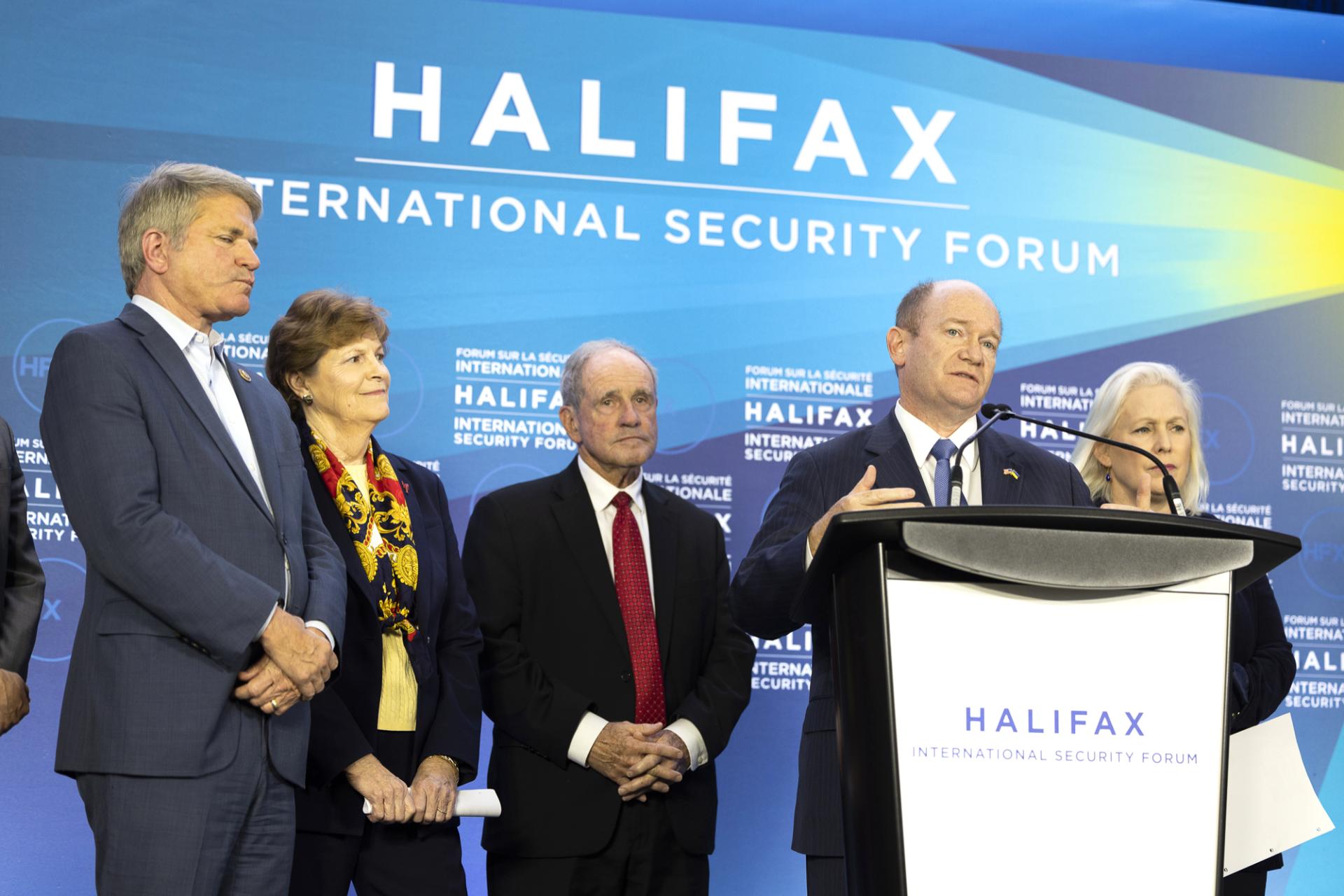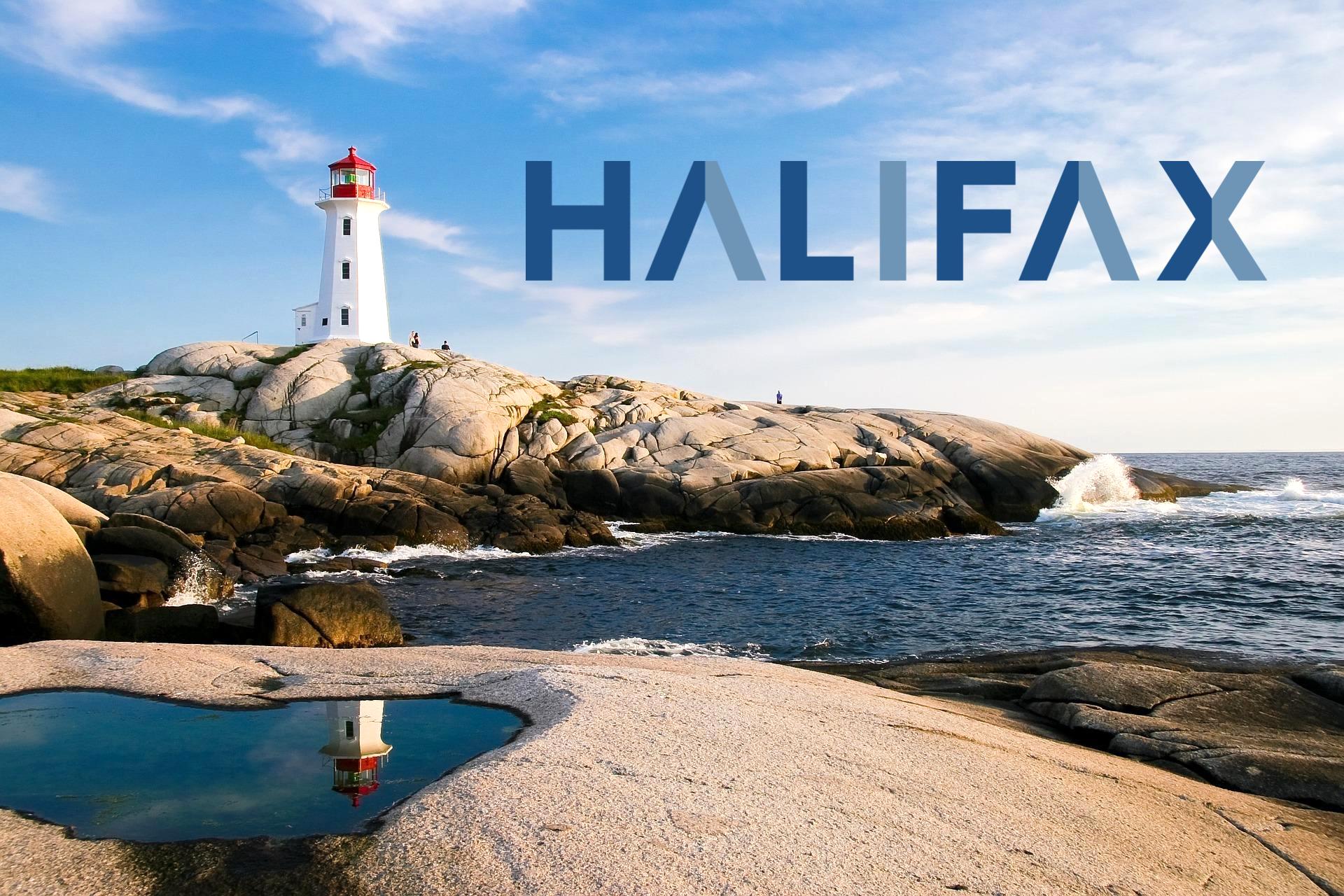HLS.Today – The secretary, speaking at the Halifax International Security Forum in Nova Scotia, said Russia’s devastating war on Ukraine is a direct challenge to sovereignty everywhere, and he praised the nations of the world for standing up for Ukraine.
Austin is at the beginning of a trip that will also take him to Jakarta, Indonesia, and Siem Reap, Cambodia, where he will attend the Association of Southeast Asian Nations’ Defense Ministers Meeting Plus.
The secretary reiterated that the new defense strategy sees China as the pacing challenge to the United States and the international rules-based system that has kept the peace since the end of World War II.
But his Halifax remarks concentrated on what the U.S. defense strategy names as “an acute threat” — Russia.
“Keeping the international system open and secure is at the heart of everything that we do,” he said. “But today, that stable, open system is under threat — and not just from the generational challenge of the People’s Republic of China, but from a tragic, devastating war in the heart of Europe.”
Secretary of Defense Lloyd J. Austin III speaks at the Halifax International Security Forum
Austin said that Russian President Vladimir Putin’s war on Ukraine is a direct threat to European security and a challenge to NATO allies. “Russia’s deliberate cruelty is an attack on our shared values — and on the rules of war,” he said.
Beyond the attack that threatens Europe, the Russian invasion of Ukraine “tears at the rules-based international order that keeps us all secure,” Austin said.
The European allies, especially those in the East “… are grappling with the instability, the destruction, the human misery, the flood of refugees, and the other dangers of an even more reckless and aggressive Russia,” Austin said. “Yet, we’ve seen an incredible response from our friends in Europe, as well as others around the globe.”

The Ukraine Defense Contact Group, which Austin chairs, is a coalition of 50 nations that has raced to bolster Ukraine’s military capabilities. The nations have delivered air defense capabilities, anti-armor systems, ammunition, food, fuel and the training the Ukrainian military needs to operate these new systems effectively. “And they have rushed to invest in their industrial production to meet their own security needs even while giving Ukraine the capabilities to defend itself in the hard months and years ahead,” Austin said.
The United States, along with fellow NATO allies, has strengthened deterrence and defense in Europe, Austin said. Even before Russia’s attack, the United States deployed or extended more than 20,000 more forces to Europe, bringing the current total to more than 100,000 U.S. service members across Europe.
A man dressed in a business suit applauds as he stands behind women in uniform.

The U.S. moved quickly and forward-stationed the V Corps Headquarters Forward Command Post, an Army garrison headquarters, and a field-support battalion in Poland. “Those are the first permanent U.S. forces on NATO’s eastern flank,” Austin said. “And we’re looking forward to welcoming Finland and Sweden, two highly capable democracies, to NATO’s ranks.”
The secretary stressed that NATO is a defensive alliance that poses no threat to Russia and seeks no confrontation with that nation. “Make no mistake: We will not be dragged into Putin’s war of choice, but we will stand by Ukraine as it fights to defend itself,” he said. “We will defend every inch of NATO territory.”
Austin said the rules-based international order is “one of the towering achievements of human government. It’s the structure of international institutions, alliances, laws and norms built at staggering cost by the Allies — including and especially the United States — in the awful aftermath of World War II.”
The Allies of World War II paid a staggering price in lives. “The price of stopping Nazi Germany and the Axis was almost unimaginable,” Austin said. “More than 400,000 American service members and more than 44,000 Canadians alone died in that war. And tens of millions of civilians around the world were lost to war and genocide. But the Allies prevailed — including the mighty contribution of the Soviet military, which suffered the shattering cost of an estimated 8 million dead or more.”
The rules-based order grew out of the Atlantic Charter first promulgated in August 1941 after a meeting between President Franklin D. Roosevelt and British Prime Minister Winston Churchill in Newfoundland. The principles that FDR and Churchill laid out in the Atlantic Charter still ring true today, Austin said. “That charter decries aggression. It rejects territorial changes against the free will of the peoples concerned. And it respects the rights of all peoples, big and small, to choose their own governments.”
That’s still the basis for the rules-based international order. “It is an order where small states have the same rights as large ones; where prosperity is shared by all peoples, not hoarded by empires or autocrats; where nuclear weapons are responsibly controlled, not used to threaten the world,” he said. “[It is an order] where disputes are solved by negotiations, not bloodshed; where sovereignty is respected, not trampled; where civilians are protected, not targeted; and a world where borders are honored, not redrawn by force.”
The United States helped build the order and didn’t walk away from the responsibility for security as it did following World War I. “U.S. leadership helped build the rules-based international order, and U.S. leadership is vital to sustain it,” Austin said. “And the people of the world don’t want to go back, to endure a grim new era of upheaval, chaos and war.”

Through his invasion of Ukraine, Putin offers a preview of “a possible world of tyranny and turmoil that none of us would want to live in, and it’s an invitation to an increasingly insecure world haunted by the shadow of nuclear proliferation,” the secretary said. This is because autocrats around the world are watching, “and they could well conclude that getting nuclear weapons would give them a hunting license of their own,” he said. “Putin’s war of choice shows the whole world the dangers of disorder.”
In a nutshell, this is the security challenge of the early 21st century. “It’s urgent, and it’s historic, but we’re going to meet it,” Austin said.
Final Day Agenda Sunday November 20th 2022 – Link
Halifax International Security Forum (also Halifax Forum or HFX) is an independent, nonpartisan, nonprofit organization headquartered in Washington, D.C. It is a forum and network for international government and military officials, academic experts, authors and entrepreneurs. Halifax Forum addresses global security issues. The forum is best known for its annual security summit at The Westin Nova Scotian in Halifax, Nova Scotia, Canada. The meeting brings together more than 300 delegates from over 70 countries and has been referred to by Canadian media as “The Davos of international security”. This summit is the only event of its kind in North America.
HLS.Today Source: Defense.GOV Wikipedia HalifaxTheForum.org Twitter







